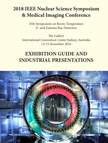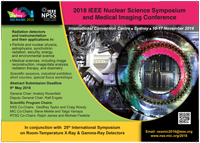A number of exciting workshops are being organized at this year's NSS/MIC by leading international experts on a wide range of topics, including advanced instrumentation for a large variety of applications spanning from underground detection up to medical imaging.
While most of the presentations will be given by invited renowned scientists, some workshops explicitly encourage young researchers to present and discuss their work. In this latter case, contributions should be submitted via the normal conference paper submission link, however minding to avoid replication with regular conference submissions.
Accepted contributions will also be eligible for regular submission as Conference Record, and more information on deadlines and format is given on the publication page
More information along with the contact data of the organizers is given in the detailed workshop description below.
We warmly encourage everyone who is interested in these topics to register if needed and attend any or all of the workshops, actively contributing with very fruitful discussions and new ideas.
Katia Parodi
Workshop Chair
Ludwig-Maximilians-Universität München, Germany
e-mail: katia.parodi@lmu.de
Submit your workshop abstract here - go to the Online Submission System
Instrumentation and measurement methods in nuclear environments are key aspects that contribute to the quality of scientific and technological programs in the fields of physics, energy, nuclear fuel cycle, Safeguards and radioactive waste management. Furthermore, measurements relying on nuclear physics now play an important role in various fields of application such as biology, medicine and environment.
For nuclear physics and technology side, nuclear experimental/research reactors are widely used around the world for various purposes, such as irradiation of material or fuel samples for present and future power reactors, safety studies, assessment of neutronic parameters (such as neutron absorption cross sections or reaction rates), production of artificial radio-elements, etc.
A sustainable nuclear energy requires research on fuel and material behaviour under irradiation with a high level of performances in order to meet following needs for the benefit of industry and public bodies:
To perform such accurate and innovative progress and developments, specific and ad hoc instrumentation, irradiation devices, measurement methods are necessary to be set up inside or beside the reactor core. These experiments require beforehand in situ and on line sophisticated measurements to accurately determine parameters such as thermal and fast neutron fluxes and nuclear heating in order to precisely monitor and control the conducted assays.
As entitled, this workshop deals with research, development and innovation in the frame of instrumentation and measurement dealing with nuclear experimental reactor such as ZPR (Zero Power Reactors), MTR (Material Testing Reactors), reactor demonstration prototypes for future nuclear power reactor / fission and fusion (GEN IV, ITER…) as well as nuclear power reactors and also nuclear fuel cycle, safeguards and homeland security and radioactive waste management.
Workshop topics will concern instrumentation and measurement in the following areas:
The workshop will be divided in two parts.
The part 1 will treat and discuss measurement and instrumentation performances, limitations, challenges and perspectives applied to nuclear research reactors as well as nuclear power reactors.
The part 2 will be dedicated to nuclear fuel cycle measurements and instrumentation (fuel measurement, reprocessing process control and assay, radioactive waste management, spent fuel measurement and characterization, spent fuel & nuclear material control).
It is foreseen to have overview talks made by recognized experts in the field of nuclear measurement and instrumentation. We also encourage young researchers and scientists as well as PhD students to present and discuss their works and research studies.
An important part of this workshop will be dedicated to discussion, exchange and interaction between the participants.
The development of new detector systems dedicated to the search of new physics in the underground laboratories is mandatory for exploring the physics beyond the Standard Model. Searches for extremely rare or even not existent processes, such as neutrino-less double beta decays, the decay of the proton, dark matter candidates or processes prohibited by the standard quantum mechanics are extremely important to better understand Nature and Universe, from particle world to the sky (cosmology). The capacity to either set limits for the investigated processes or to, finally, discover them strongly depends on the dedicated detector systems technologies and performances.
In the last 5 years huge progress was achieved both in developing new detector concepts or pushing to the limits the existing ones, by refining the involved technologies. Various detector systems, going from cryogenic solids and large liquid masses, to radiation detectors, such as silicon drift detectors, ultrapure germanium detectors, dedicated photo-multipliers, and particle detectors, such as directional TPC, were developed and some of them are already installed and in data taking at major underground laboratories in the world. Some other detector systems is being optimized for future-generation experiments.
This DEUS workshop will introduce to the non-experts in the Underground Searches of new physics the main physics ideas and motivations for these searches, together with the main technologies for detector systems dedicated to the searches of neutrino-less double beta decays, decay of the proton, dark matter candidates or processes prohibited by the standard quantum mechanics of dark matter.
Introductory talks from experts belonging to experiments currently in operation will review the current status of their detectors and will introduce the challenges which they face in carrying out the physics program and young scientists will present specific topics related to their research in the field. Future plans for the development and use of new technologies which could either improve or revolutionize the underground physics will be discussed.
The workshop will be held on Sunday 11 November 2018.
The interested participants, in particular young scientists, are encouraged to participate and to present their research activity and results, especially focused on the new ideas for the development of detectors dedicated to the underground searches of new physics.
Developments in nuclear and X-ray science underpin a wide range of industrial and medical technologies. Well-known examples include the many forms of medical imaging (XRT, CT, PET, SPECT, etc), radiotherapy, product sterilisation and a wide range of techniques for materials analysis. But how do new technologies make the transition from laboratory to market place?
This workshop is aimed at scientists interested in learning more about the different pathways for commercialising their research. Key questions that will be addressed include:
The workshop will be organised in three sessions.
In the first, several successful scientists-turned-entrepreneurs who have made the transition from laboratory to business will talk about their experiences. All the speakers started in a research environment working in a range of X-ray and nuclear fields. They will discuss what inspired them to make the leap, their successes and failures, and lessons learned in turning their idea into a product.
The second session will introduce a panel of commercial, legal and financial experts who will offer their insights into some of practicalities of starting a new business venture. The panel will cover intellectual property protection and patenting; finding partners; preparing an investment pitch; developing a business plan; and the benefits and drawbacks of different funding sources.
After both sessions, there will be ample time for questions and discussion.
In the final session of the workshop, participants are invited to give an informal, 3-minute pitch of a technology idea that addresses a significant market need. Technologies can be at any stage from early concept through to near-maturity, but should have a clear application. Constructive questions and feedback will be encouraged after each presentation. Interested participants should submit a short abstract describing the opportunity, their solution and a potential route to market.
The workshop will be an excellent opportunity for both early-career and more experienced researchers to hear first-hand about the joys and trials of life outside of the laboratory, and to present their own ideas for the 'next big thing' in nuclear science or medical imaging.
latest news
Dec 29 - Winners of the $200 Amazon Gift Vouchers
1. Martin Nikl, Institute of Physics, Academy of Sciences of the Czech Republic
2. Laura Stonehill, Los Alamos National Laboratory
Oct 01, 2019 - Conference Records are available
Oct 25 - Conference app is now available
Oct 24 - Conference Record upload is now available
Oct 23 - Presentation upload is now available
Sept 19 - Exhibit Guide Book published
Sept 13 - Guide to Conference Records
Sept 10 - All Grants are now announced
Aug 09 - Notes for Exhibitors
Aug 03 - Online Program available
Jul 05 - Registration is open
Exhibit Guide Book Download (3.2 MB)
Conference Poster Low-Res (0.5 MB) High-Res (15.5 MB)
